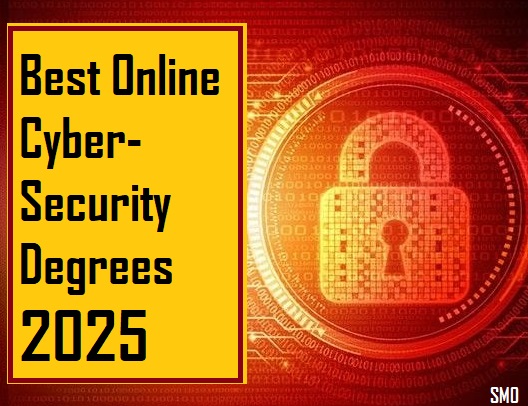As businesses and governments rely more on digital platforms, cybersecurity threats have escalated—creating a skyrocketing demand for trained professionals. Whether you’re a working adult looking to switch careers or a recent graduate eager to break into tech, earning a cybersecurity degree online is one of the smartest educational investments in 2025.
In this comprehensive guide, we review the best online cybersecurity bachelor’s degree programs, highlight tuition costs, certification readiness, and offer expert insights into the job market, financial aid, and more.
What is an Online Cyber Security Degree?
An online cybersecurity degree is an academic program that equips students with the knowledge and skills to:
- Protect networks from cyber threats
- Manage secure data infrastructures
- Detect vulnerabilities in systems
- Respond to data breaches
- Understand legal and ethical implications of security
Most programs offer a Bachelor of Science (B.S.) in Cybersecurity, typically requiring 120–130 credit hours over 3–4 years.
Why Choose an Online Cyber Security Program?
Here are the key benefits:
- Flexible Scheduling: Learn at your pace, ideal for working students
- Lower Costs: No on-campus housing, travel, or relocation expenses
- Access to Top Programs: Study with leading universities no matter your location
- Certifications Built-In: Many programs prepare you for Security+, CISSP, CEH, and more
- High ROI: Cybersecurity professionals often earn $90,000+ annually
According to the U.S. Bureau of Labor Statistics, cybersecurity jobs will grow 32% by 2032—far faster than the average for all occupations.
Best Accredited Online Cyber Security Degrees – 2025 Rankings
Here are some of the top programs for 2025 based on affordability, flexibility, accreditation, and student outcomes:
| University | Tuition (Est.) | Accreditation | Key Features |
| Western Governors University (WGU) | $3,625/term | NWCCU | Self-paced, certs included |
| Southern New Hampshire University (SNHU) | $330/credit | NECHE | 100% online, flexible terms |
| Purdue University Global | $371/credit | HLC | Prepares for industry certs |
| University of Maryland Global Campus (UMGC) | $312/credit (in-state) | MSCHE | Cyber Ops Track, NSA-recognized |
| Drexel University | $572/credit | MSCHE | High prestige, career services |
| ECPI University | $577/credit | SACSCOC | Accelerated 2.5-year path |
| Dakota State University | $354/credit | HLC | NSA-designated Center of Academic Excellence |
All programs listed are regionally accredited and financial-aid eligible.
Sample Course Curriculum
Most programs combine IT core studies with advanced cybersecurity topics. Typical courses include:
- Intro to Cyber Security
- Network Security
- Digital Forensics
- Ethical Hacking & Penetration Testing
- Cryptography
- Operating Systems Security
- Cyber Law and Policy
- Cloud Security
- Cybersecurity Capstone Project
Tuition and Cost Comparison
| School | Per Credit Cost | Estimated Total Tuition |
| WGU | Flat-rate | ~$15,000 (2.5–3 yrs) |
| SNHU | $330 | ~$39,600 (120 credits) |
| UMGC | $312 (MD residents) | ~$37,000 |
| Purdue Global | $371 | ~$44,520 |
| Dakota State | $354 | ~$42,000 |
Look for schools that offer credit for certifications, work experience, or military training to reduce cost and time.
Financial Aid Options
All top online cyber security degree programs accept:
- FAFSA (Free Application for Federal Student Aid)
- Pell Grants (if eligible)
- Federal Direct Subsidized/Unsubsidized Loans
- Scholarships (university, private, state-based)
- GI Bill and VA benefits
- Employer Tuition Assistance
Apply for FAFSA early to maximize your aid package at studentaid.gov.
Cybersecurity Job Market & Salary Outlook
Cybersecurity experts are in-demand across industries like healthcare, finance, education, defense, and cloud services.
| Career Path | Average Salary (U.S.) |
| Information Security Analyst | $112,000 |
| Ethical Hacker | $105,000 |
| Network Security Engineer | $110,000 |
| Cybersecurity Consultant | $125,000 |
| Security Operations Center (SOC) Analyst | $90,000 |
| Chief Information Security Officer (CISO) | $160,000+ |
Cybersecurity professionals with a bachelor’s degree and certifications have access to leadership-level roles and six-figure salaries.
Industry Certifications Worth Pursuing
Many online programs align with or include prep for:
- CompTIA Security+
- Certified Ethical Hacker (CEH)
- Certified Information Systems Security Professional (CISSP)
- Certified Information Security Manager (CISM)
- GIAC Security Essentials Certification (GSEC)
Some universities offer exam vouchers, further saving you hundreds of dollars in certification fees.
How to Apply
Step 1: Select a Program
Choose based on cost, schedule, certification support, and faculty credentials.
Step 2: Submit Your FAFSA
Visit studentaid.gov and apply as early as possible.
Step 3: Prepare Application Materials
Common requirements include:
- Transcripts
- ID verification
- Resume (optional)
- Application essays or statements of purpose
Step 4: Apply Online
Most schools offer rolling admissions, so apply when you’re ready.
Step 5: Enroll and Begin
Register for your first term, complete any onboarding, and start learning!
Tips to Succeed in an Online Cyber Security Program
- Create a study schedule and stick to it
- Engage in discussion forums and peer projects
- Take advantage of virtual labs and hands-on simulations
- Begin studying for certifications during your degree
- Use school-provided career services for job placement help
Frequently Asked Questions
Q1: Are online cybersecurity degrees respected?
Yes. As long as the school is regionally accredited, employers recognize these degrees equally with traditional ones.
Q2: Can I work full-time while studying?
Absolutely. Most online programs are asynchronous, giving you flexibility to work and study on your schedule.
Q3: Is financial aid available?
Yes. All top programs accept federal and state aid, scholarships, and employer tuition assistance.
Q4: Do I need prior experience in tech?
Not necessarily. Many programs are beginner-friendly, but a basic understanding of computers and networks is helpful.
Q5: Can I get a cybersecurity job right after graduation?
Yes! Entry-level roles like SOC analyst, cyber technician, and junior pen tester are perfect starting points.
Summary Table: Top Online Cyber Security Degrees (2025)
| Program | Format | Cost Range | Certifications Included | Duration |
| WGU | Self-paced | Low | Yes | 2.5–3 years |
| SNHU | Flexible | Moderate | No | 4 years |
| Purdue Global | Structured | Moderate | Optional | 4 years |
| UMGC | Flexible | Low (in-state) | Yes | 4 years |
| ECPI | Accelerated | Higher | Yes | 2.5 years |
| Drexel | Semester-based | Higher | Optional | 4 years |
Which Cybersecurity Program Is Right for You?
The best online cyber security degree is the one that fits your career goals, budget, and schedule. Whether you’re seeking affordability, certification training, or academic prestige, there’s a program that fits your needs.
In 2025, cybersecurity is not just a career—it’s a mission-critical profession that protects the digital future of governments, businesses, and individuals.
Choose a top accredited online program, apply for financial aid, and start your cyber journey today.










